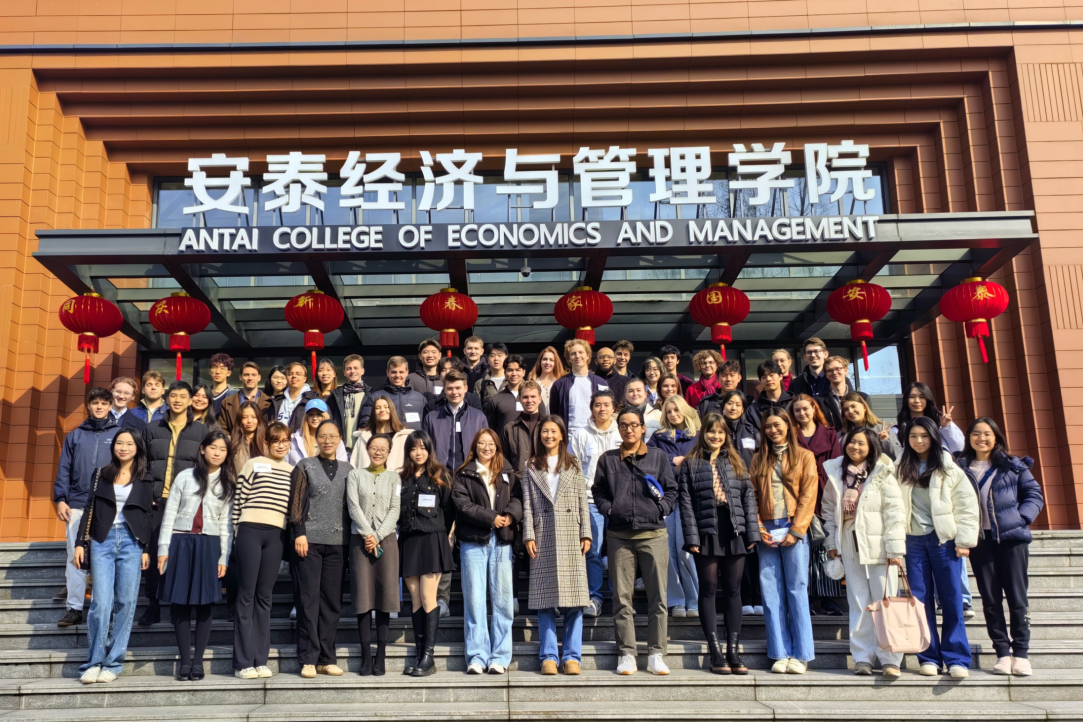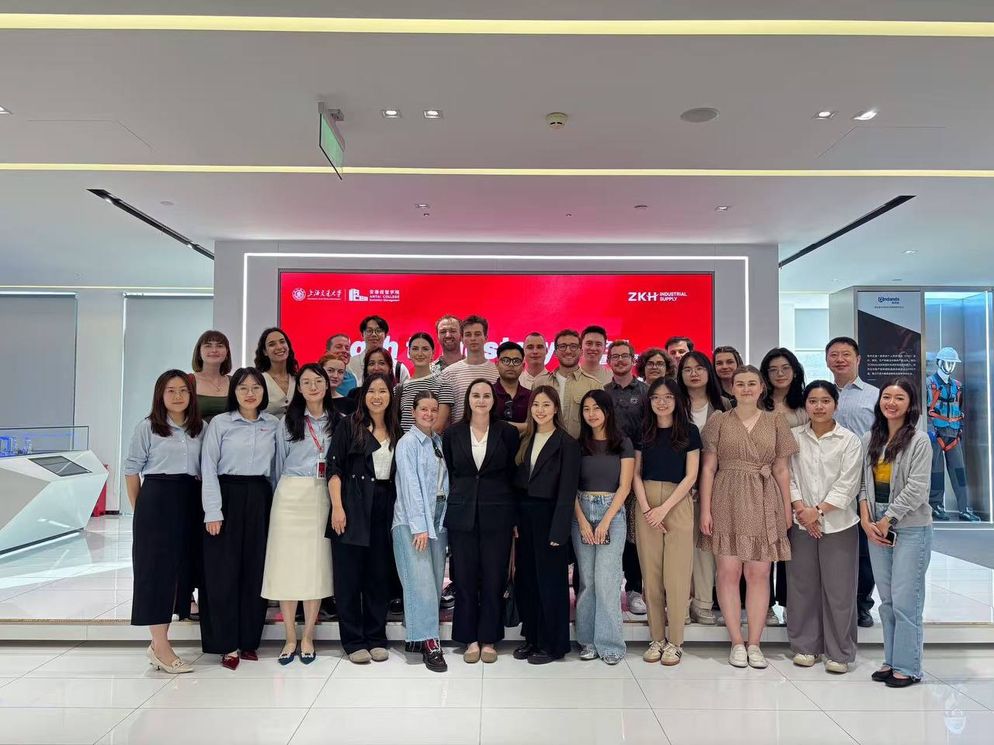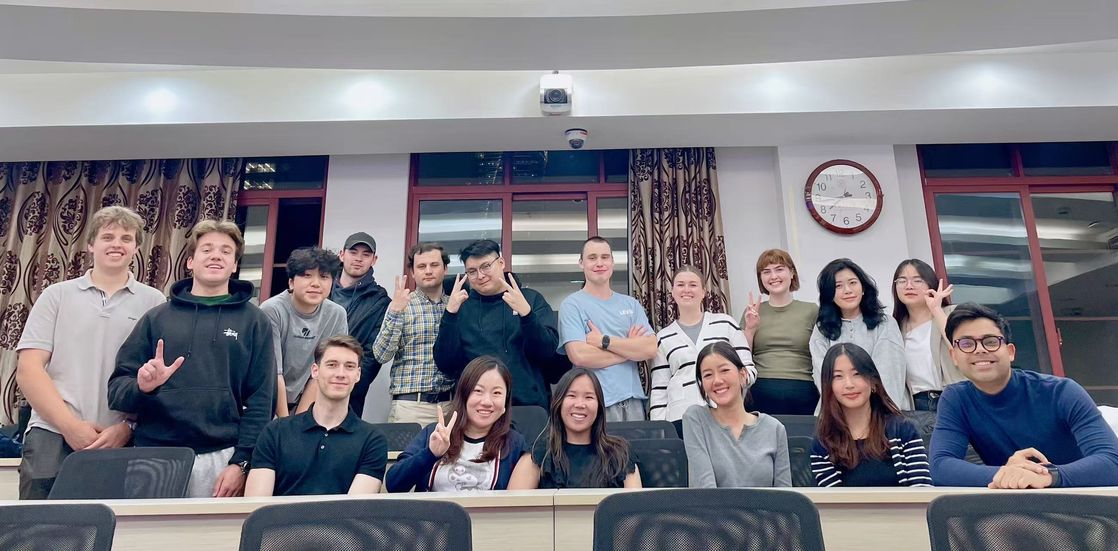"Shanghai inspires": academic mobility experience at Antai College of Economics and Management
Anna Yurgelas, a Master's student at the HSE Graduate School of Business (GSB) in the International Management program, shares her impressions of the Spring 2024/2025 mobility semester at one of the best universities in China — Shanghai Jiao Tong University.

Why did I choose Shanghai?
If you're just beginning to explore Asia or want to strengthen existing ties with the region, as was my case, going on mobility in Shanghai is a great choice. I especially recommend the spring semester: the climate is comfortable, and additional opportunities arise to get to know the country.
Six years ago, I first visited Shanghai as a tourist. In spring 2024/2025, I had the chance to return to this amazing metropolis — this time as a student at one of China's leading universities. Antai College of Economics and Management is among the top business schools in the Asia-Pacific region (according to the Financial Times) and was the first in the country to receive the three prestigious international accreditations: AACSB, EQUIS, and AMBA. This was an important factor in my decision.
Academic process: comfortable, flexible, in English
An international community
Studying at Antai means constant interaction with an international audience. Exchange students come from all over the world: Australia, Sweden, Italy, Canada, Southeast Asia, Africa, Europe, and Latin America. A unique feature of the “Master in International Business” program is that it is only open to international students — Chinese citizens are not admitted. This helps foster quick mutual understanding, team spirit, and collaborative problem-solving.
From me: I was incredibly lucky with the people I met: we shared experiences, discussed practices in our countries, and became close friends. We were inspired to learn and travel together. We even started a tradition — taking group photos with our professors. This is something I’ll remember for years to come.
A familiar academic structure
The grading system, teaching approaches, and digital platforms are very similar to HSE. Grades are based on a percentage system, and the Canvas platform (similar to Smart LMS) is used to access course materials, schedules, and results. To access it, you need to register on the Jaccount platform — which also functions as a universal app: you can use it to book a gym session, buy inter-campus bus tickets, check your schedule, and much more.
From me: The first few days, of course, required some adjustment. But thanks to orientation days, support from classmates, timely help from the academic office, and clear guides, the process went smoothly and quickly.
Custom course selection
At Antai, students have much more flexibility. You can choose courses that truly interest you, rather than just "checking the boxes." For example, I chose to focus on humanities-related business courses and skip statistics. This helped me efficiently meet my academic requirements at GSB.
From me: Courses last from 6 to 12 weeks, allowing you to plan your semester flexibly. I started with an intensive workload and later freed up time for extracurricular activities like exhibitions, events, and travel.
Features of the Chinese educational environment
For the first time, I encountered a system where attendance is tracked via QR code scans in WeChat. Group chats with professors, course materials, quizzes, and surveys are all conducted there. Classes are often recorded — so you can rewatch them at a convenient time. Additionally, students get access to international resources, like the Bloomberg database.
From me: Use all the available opportunities! Subscribe to event newsletters, attend conferences and networking sessions, and explore library and computer lab platforms and resources. It truly broadens your horizons.
Immersion in Chinese culture and business thinking
Every course touched on Chinese business in some way. We studied local company strategies, management logic, production priorities, and consumer behavior. We discussed cases with professors, many of whom have international work experience — most often in the U.S.
From me: I especially remember lectures that discussed Russia and its role in the Chinese economy: we’re viewed as a serious player, especially in the context of energy and logistics. It was incredibly valuable to see how other countries view us.
Campus and daily life: convenient, safe, European-style
The campus is located in the Xuhui district — nearly the city center, with a European atmosphere and excellent infrastructure. Nearby are shops, cafes, banks, and the metro.
From me: Everything is within walking distance or a short metro ride away. Intersecting metro lines allow you to get anywhere — even the airport or the other side of the city.
The campus has everything you need: libraries, co-working spaces, cafes (including Starbucks and KFC), canteens, and relaxation areas. Business students live directly on the main campus, in the Tao Li Yuan dormitory.
From me: My classes were in the Upper Hall building — just a 5-minute walk from the dorm. On the first floor of the dorm, there’s a co-working space open until midnight. Entry is by facial recognition, so there's absolutely no need to worry about safety. There’s a laundry, quiet floors, and couches in the lobby. The most comfortable floors are the third and above — fewer insects and better room conditions. I personally lived on the quiet fourth floor with couches in the lobby.
Why choose China (and specifically Shanghai)?
China is vast and multifaceted. You can travel, study, immerse yourself in the culture, and observe how business operates under different conditions.
From me: I visited 14 cities during the semester! Student discounts, high-speed trains, and affordable lodging and food made it possible. My personal tip is the Trip.com app — you can pay in rubles using a Russian card.
China’s business environment is unique. Competition works differently — you might find several identical shops on one street. But there are tons of pop-up stores, brand collaborations, and creative marketing solutions.
From me: It’s amazing to be both an observer and participant in this process. And even more fascinating to experience both sides — as a consumer and a potential employer/trade partner during university sessions.
Shanghai is a transportation hub and cultural center. From here, you can take day trips to Suzhou, Hangzhou, and Nanjing. It’s also the second-busiest transport hub after the capital and is especially popular and accessible for cheap travel to South Korea and other Southeast Asian countries. There’s always something to do in Shanghai — even after a semester, I didn’t manage to see all the city’s landmarks. It’s a magnet for international exhibitions, concerts, theatrical performances, and other events. It’s the quintessence of tradition and modernity.
What to keep in mind before your trip?
Weather: Spring in Shanghai resembles St. Petersburg — humid, cool, and no central heating. Bring warm clothes and rain boots, or order them on Taobao and Pinduoduo.
Payments: China has almost fully transitioned to WeChat Pay and Alipay. You can top up via a Chinese bank account (I opened one at ICBC — very convenient) or use UnionPay cards (even from Russian banks).
Health: High population density = higher risk of colds. Bring the necessary medications. Healthcare is cheap, but doctors rarely speak English. Make sure you have insurance.
In conclusion
I’m immensely grateful to the Graduate School of Business for the opportunity to take this intense, vivid, and truly transformative academic journey. Mobility at Antai College is not just about studying — it’s a real journey into the future.
If you have any questions about life, study, or mobility in China, feel free to contact me on Telegram (@yurgelia) or by email: alyurgelas@edu.hse.ru. I’d be happy to share my experience!
Feedback on Antai College of Economics and Management. Part 1
 Video: Anna Yurgelas
Video: Anna YurgelasFeedback on Antai College of Economics and Management. Part 2
 Video: Anna Yurgelas
Video: Anna Yurgelas